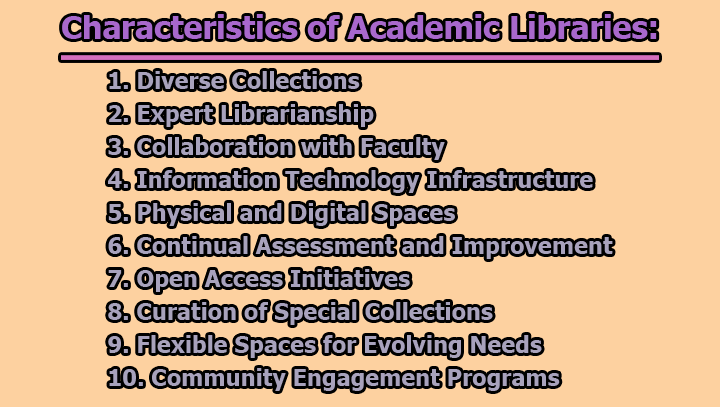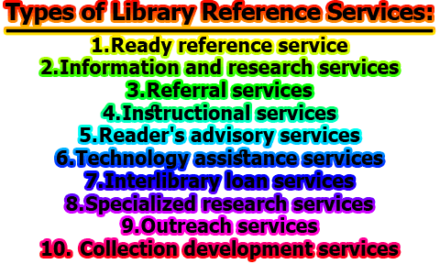Importance and Characteristics of Academic Libraries:
Academic libraries play a pivotal role in supporting the educational mission of institutions by providing essential resources and fostering a conducive learning environment. In this article, we will explore the importance and characteristics of academic libraries, shedding light on their multifaceted contributions to the academic community.
Importance of Academic Libraries:
1. Information Access and Retrieval: Academic libraries serve as repositories of knowledge, offering a vast array of books, journals, and digital resources. They facilitate easy access to information, empowering students and researchers to enhance their academic pursuits.
2. Research Support: A crucial aspect of academic libraries is their role in supporting research endeavors. They provide access to specialized databases, archives, and rare collections, enabling scholars to conduct in-depth research and contribute to the advancement of knowledge.
3. Learning Resource Centers: Academic libraries serve as learning resource hubs, offering textbooks, reference materials, and multimedia resources. These materials complement classroom instruction, providing students with additional learning resources to deepen their understanding of various subjects.
4. Technology Integration: Modern academic libraries embrace technology, offering computer labs, online catalogs, and digital repositories. This integration enhances the learning experience by providing students with tools and resources that align with contemporary educational practices.
5. Cultural Preservation: Academic libraries often house rare manuscripts, historical documents, and cultural artifacts. This preservation of cultural heritage fosters a sense of continuity, allowing students and researchers to explore and appreciate the rich tapestry of human knowledge and history.
6. Collaborative Learning Spaces: Beyond traditional quiet study areas, academic libraries now feature collaborative spaces equipped with multimedia tools. These spaces encourage group work, discussions, and project collaboration, fostering a sense of community among students.
7. Information Literacy Development: Academic libraries play a crucial role in cultivating information literacy skills. Librarians educate students on effective research methodologies, evaluating sources, and navigating the information landscape, empowering them to become discerning consumers of knowledge.
8. Support for Diverse Learning Styles: Recognizing the diversity in learning styles, academic libraries provide resources in various formats, including books, e-books, audiobooks, and multimedia materials. This inclusivity ensures that students with different learning preferences can find materials that suit their needs.
9. Continual Adaptation to Technological Advances: To remain relevant, academic libraries continually adapt to technological advancements. They embrace online platforms, e-books, and digital resources, ensuring that students and researchers have access to cutting-edge information in a rapidly evolving academic landscape.
10. Community Engagement: Academic libraries serve as community hubs, hosting events, workshops, and lectures that engage both students and the broader community. This fosters a sense of intellectual curiosity and collaboration, enriching the academic experience beyond the confines of the classroom.
Characteristics of Academic Libraries:
Academic libraries play a crucial role in supporting the teaching, learning, and research activities of academic institutions. They have distinct characteristics that set them apart from other types of libraries. Here are some key characteristics of academic libraries:
1. Diverse Collections: Academic libraries curate diverse collections that encompass a wide range of disciplines, ensuring that they cater to the varied needs and interests of students, faculty, and researchers.
2. Expert Librarianship: The presence of skilled librarians is a defining characteristic of academic libraries. Librarians provide guidance on research methodologies, assist with information retrieval, and contribute to the development of information literacy skills.
3. Collaboration with Faculty: Successful academic libraries collaborate closely with faculty members to align their collections and services with the curriculum. This collaboration ensures that the library remains an integral part of the academic experience.
4. Information Technology Infrastructure: Academic libraries invest in robust information technology infrastructure, including online catalogs, databases, and digital repositories. This facilitates efficient information retrieval and supports the integration of technology into the learning environment.
5. Physical and Digital Spaces: Academic libraries feature both physical spaces for quiet study and collaboration, as well as digital spaces that provide access to e-books, online journals, and multimedia resources, accommodating the diverse needs of users.
6. Continual Assessment and Improvement: Academic libraries engage in continual assessment to evaluate the effectiveness of their services and collections. This process allows them to adapt to changing user needs and improve the overall quality of their offerings.
7. Open Access Initiatives: Many academic libraries actively participate in open access initiatives, making scholarly research and resources freely accessible to the public. This commitment to openness aligns with the principles of knowledge dissemination and accessibility.
8. Curation of Special Collections: Academic libraries often house special collections that include rare manuscripts, archives, and unique materials. These collections contribute to the institution’s prestige and offer valuable resources for scholarly research.
9. Flexible Spaces for Evolving Needs: Recognizing the dynamic nature of education, academic libraries create flexible spaces that can adapt to evolving needs. This includes areas for quiet study, group collaboration, and the integration of emerging technologies.
10. Community Engagement Programs: Successful academic libraries actively engage with the broader community through outreach programs, workshops, and events. This community-focused approach extends the impact of the library beyond the academic setting.
In conclusion, academic libraries stand as indispensable pillars in the educational landscape, providing invaluable resources and services that support learning, research, and community engagement. Their evolving nature, characterized by technological integration and adaptability, ensures they remain vibrant and relevant in the ever-changing world of education. As academic libraries continue to evolve, their role in shaping the intellectual landscape of institutions remains more crucial than ever.

Former Student at Rajshahi University










